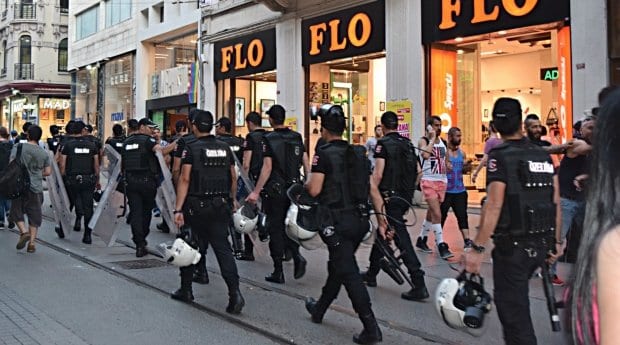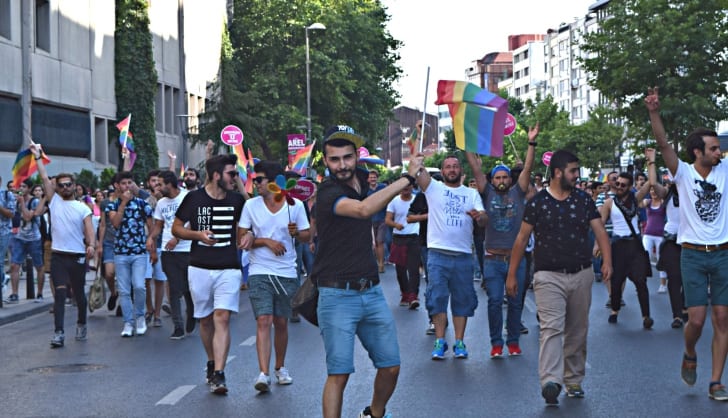Can sways to a throbbing electro beat in one of Istanbul’s most popular gay clubs. He and Emre have travelled here from their small hometown in the east of Turkey to get a taste of gay nightlife and to live, if only for a few days, as openly gay.
“We can’t do this at home,” Can says. Emre nods in agreement.
Together they revel in the space, as if to squeeze as much of themselves out into the world before they head back home to small towns and secret lives.
Like Can and Emre, thousands of LGBT people from across Turkey and in the region flock to Istanbul and other large cities for freedom, but that could quickly become a thing of the past.
On Nov 19, 2017, the country’s capital, Ankara, announced a ban on LGBT events like film festivals and discussion panels.
For advocates in cities like Istanbul, where LGBT nightclubs, cafes and events are still numerous, the announcement came as a shock.
“I’m concerned that this ban will not only be for LGBT in Ankara, but it’s going to be spread out to other mega-cities like Istanbul, Izmir and Eskiehir,” says Rozerin Seda Kip, a human rights lawyer with a focus on LGBT rights.
The timing and reasoning behind the announcement are unclear, she says.
“Before this statement, LGBT people organized lots of events like panels and other events; it is hard to understand why this, right now,” Kip tells Xtra.
The governor’s office in Ankara released an official statement that LGBT events scheduled around the city could threaten public safety and “harm the protection of other people’s rights and liberties, public health and morality.”
The statement also suggests that LGBT events could provoke reactions against attendees “due to certain social sensibilities.”
The announcement comes just days after Ankara cancelled an LGBT film festival organized by the German embassy.
Prior to the festival’s Nov 15 opening, a number of anti-LGBT hashtags circulated on social media calling for its cancellation. The governor’s office waited until opening day before telling organizers to shut the festival down.
“It would openly incite grudge and enmity of a segment of the public which has different features in terms of social class, race, religion, sect and region against another segment, and thus there might emerge a clear and close danger in terms of public safety,” officials said in a statement.
Hosting such events could also incite terrorism, the statement indicated, adding it’s the government’s aim to protect general health, morality, rights and freedoms.
Turkish advocacy groups vow to take legal action
Two of the oldest LGBT organizations in Turkey say the ban is “illegal, discriminatory and arbitrary.”
“There can be no legitimate or legal grounds for such a wholesale ban that touches the core of rights,” KAOS-GL said in a joint statement with Pink Life on Nov 20.
“In our country where discrimination and hate based on sexual orientation and gender identity is rampant, it is the duty of national and local administrations to combat this discrimination and hate,” the statement continued.
But taking action against government decisions isn’t easy. Turkey has been in a state of emergency since a failed coup in July 2016, which has given the government sweeping powers, including banning public gatherings, setting curfews and searching people without authorization.
The European Convention on Human Rights was suspended right after the country moved into the state of emergency. Although the Turkish Constitution says a state of emergency can be declared for a maximum of six months, it has already been extended five times.
How Pride morphed into tear gas and protest
Homosexuality is not illegal in Turkey, but conservative elements run deep.
Alex Benjamin is an aid worker and human rights activist from Norway who has spent the past year assisting LGBT people in distress in Turkey. “I have met many people who have been harassed, bullied and even raped,” he says.
He thinks the Ankara governor’s decision could worsen an already declining situation for the LGBT community in Turkey.
It’s a far cry from just a few years ago.
In 2014 Istanbul held one of the largest Pride parades in the region, with close to 100,000 people marching down the famed Istiklal Street in the city’s centre. Participants chanted, kissed and danced while riot police stood watch on the periphery.
But the government has banned the Pride parade every year since then. For LGBT people courageous enough to march anyway, they’ve been met with tear gas and rubber bullets from police bent on enforcing the ban.

Turkish police move through downtown Istanbul in June 2015 where they will use tear gas and rubber bullets to disperse Pride marchers. Credit: Joti Heir/Xtra
In banning this year’s parade, officials cited public safety as a concern, as a wave of anti-LGBT activism swept social media in the week prior to the planned event. Despite the ban, at least 100 people marched through the city centre for Pride. At least 25 people were arrested. They are in court facing charges this month.
How this could be the backslide that ends it all
Turkey is moving away from its international human rights obligations, says Nils Muiznieks, a commissioner for human rights with the Council of Europe.
Whether or not an event may disturb or offend some people is no justification to curtail its attendees’ legitimate rights to freedom of expression and freedom of association, he says.
For now, young LGBT people like Can and Emre still have spaces and places they can see as their own and people they can talk to openly in Istanbul, but in the coming months this could all change.
The decision made to ban LGBT events in Turkey’s capital of Ankara could set a precedent, jeopardizing space spaces for LGBT people across the country.
“They banned the gay Pride and now they started banning all LGBT activities. And this is just the beginning,” warns Benjamin, the aid worker from Norway. “Who knows if in the future if they won’t consider being gay a crime?”

 Why you can trust Xtra
Why you can trust Xtra


